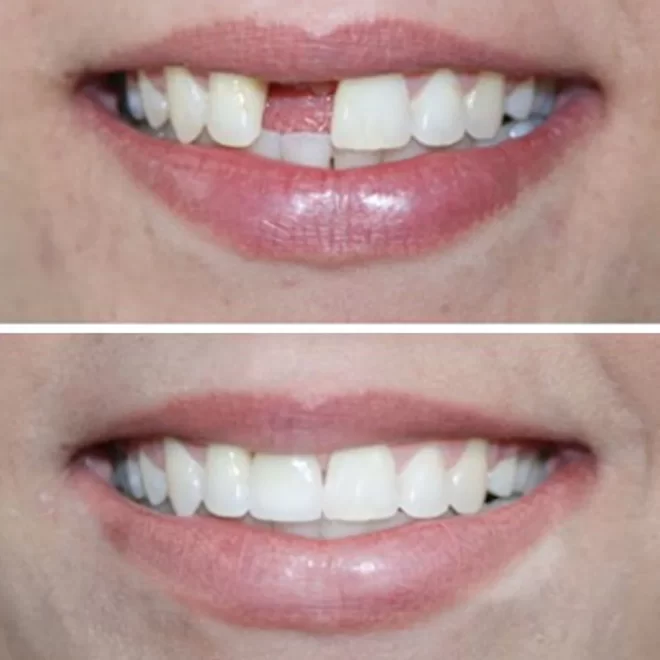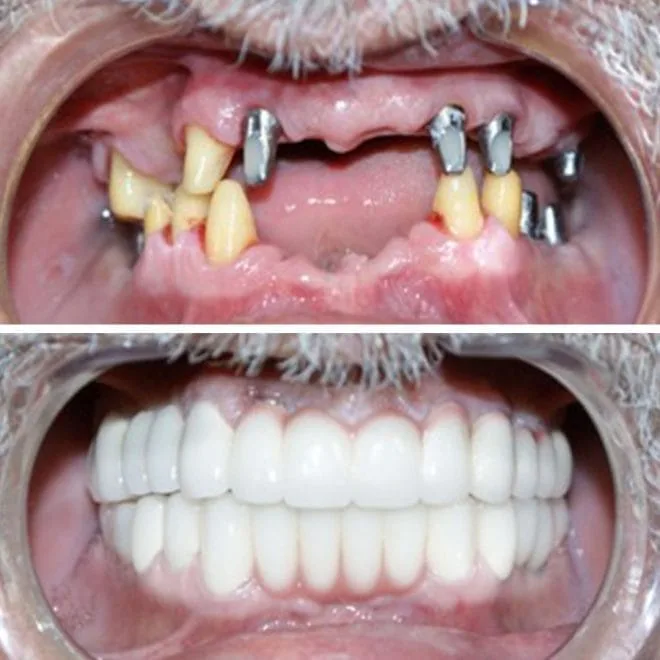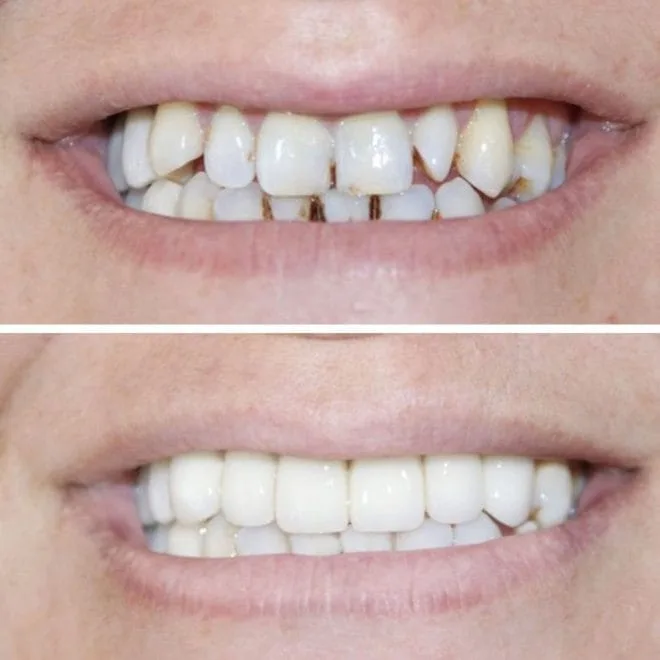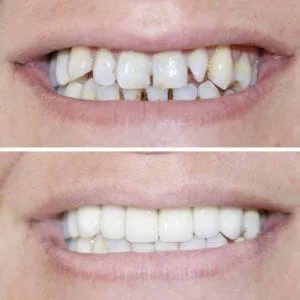

Restore your smile
Dental Implants in Antalya, Turkey
Many people prefer dental implants to improve dental health. Bridges and dentures are the first to come to mind for treatment. However, dental implants have been added to the options. During dental implant surgery, titanium implant roots take the place of missing tooth roots. Therefore, dental implants act like real teeth.
Many people struggle with tooth loss for various reasons, such as periodontal disease or injury. And tooth implant procedure helps you get rid of the discomfort of tooth loss. At Lara Smile, we have achieved a nearly 100% success rate for dental implant placement.
What are Dental Implants?
Dental implants are a permanent and stable method thanks to the screws that replace the tooth roots. It eliminates the problems with your damaged teeth. Most people experiencing tooth loss prefer dental implants to get rid of the problem. It is the most optimal procedure to have healthy and strong teeth.
Dentures and bridges sometimes do not fit well into the gap between teeth. Because the lack of tooth roots does not allow dentures or bridges to be strong enough. In this case, dental implant surgery provides a good solution. The titanium edges of the implants merge with the jawbone and create a strong foundation. Therefore, the implant has a stable condition not to damage the bone and gum as bridges and dentures do when they glide.
What is the Best Type of Tooth Implant?
It is not good to accept any certain type of dental implants as the best choice without a deep medical examination. The type of dental implant you can choose may vary depending on how healthy your jawbone is, how many teeth you have missing, and your other special needs. You can decide whether endosteal or subperiosteal implants are best for you with the help of your dental implant specialist.
Dental Implant Brands used by Lara Smile








How Does Dental Implantation Proceed?
The period of planning is the most significant step of the process. A meticulously structured treatment plan is the best way to place the implants.
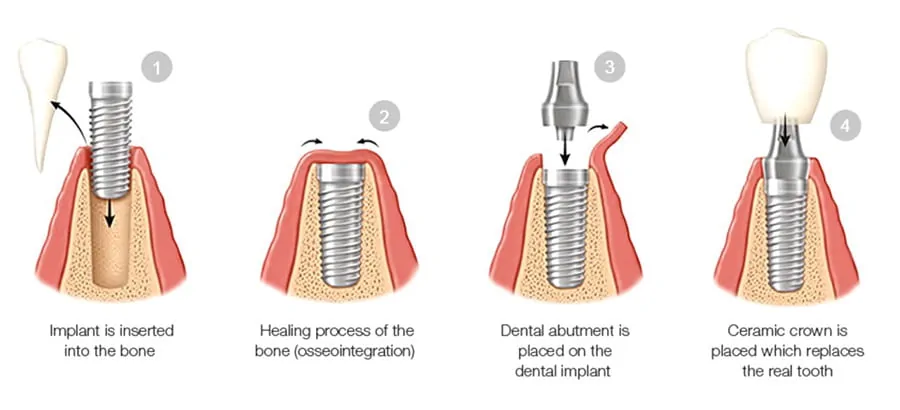

- Special imaging and 3D imagining help dentists understand the jawbone’s condition and place the implant properly.
- Removal of damaged teeth.
- If necessary, bone grafting to prepare the jawbone.
- Placement of metal posts into the jawbone.
- Attachment of temporary crown to the abutment by using local anesthesia.
- Zirconium teeth replace temporary teeth after 6-12 months.
Dental Implants Before After Photos
What are the Most Common Types of Dental Implants?
There are two most common dental implant types: endosteal implants and subperiosteal implants. The main difference between these two types is how they are attached to your jawbone. The health and the condition of your jawbone affect the type of implant. Therefore, you need to get help from your doctor to determine which type of implant is the most suitable for you before your treatment start.
Endosteal implants are the most preferred type of dental implant. They have a small screw, cylinder, or blade shape. They are placed into the jawbone and, thus, hold teeth. Plus, endosteal implants are an alternative to a bridge or a denture.
Subperiosteal implants are placed on the jawbone. In subperiosteal implant surgery, a metal post is placed under the gum. This type of implant is suitable for you if you cannot wear ordinary dental dentures because the condition of your jawbone is not good enough. In addition, with this type of dental implant, you do not need to have a bone augmentation procedure for your jawbone.
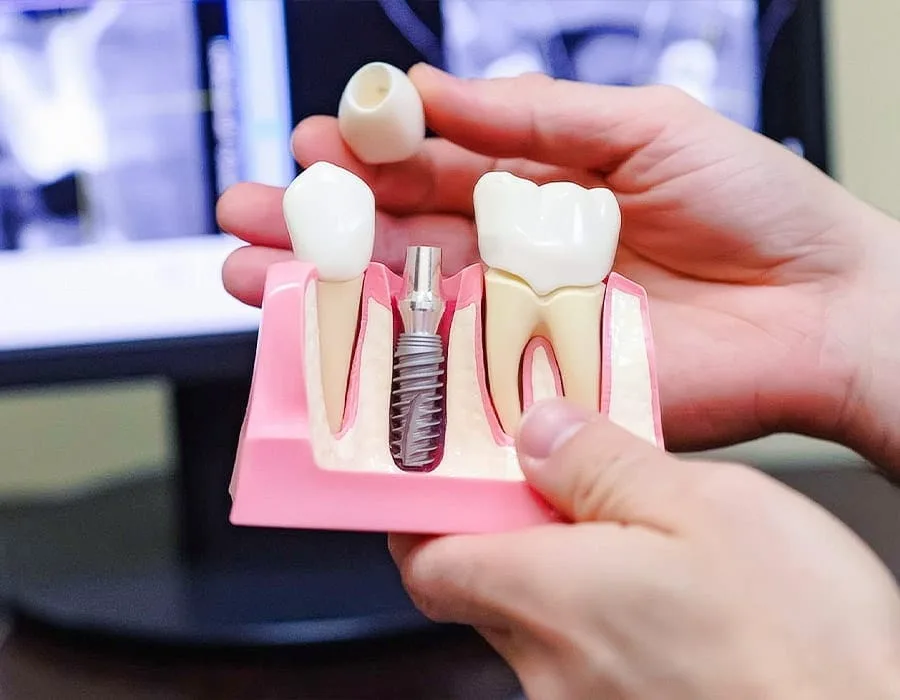

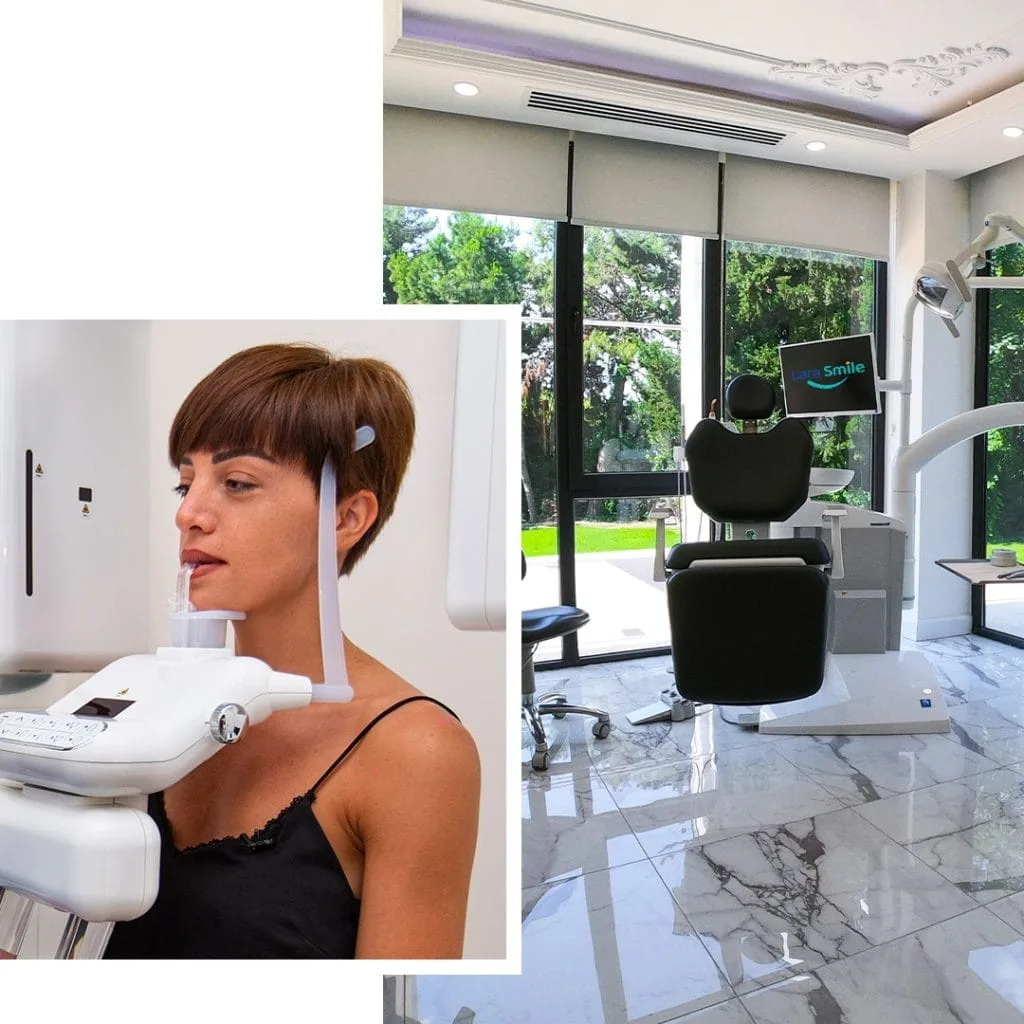

What are the Advantages of Implants?
Dental implants have multiple advantages regarding the hygiene of the gum and jawbone. They help you maintain your comfort, prevent further problems, and protect the aesthetic look of your face.
- Dental implants act in a close manner to natural teeth. Therefore, they give you the strength to chew and evenly distribute the chewing load.
- A teeth implant does not require special care. You can brush and floss them as natural teeth when your treatment plan is completed.
- Dental implants can last much longer than dentures and bridges. Dental bridges last about 10 years, but you can use your implants for a lifetime. Also, implants are made of biocompatible titanium. As a result, they do not contain any toxication and negatively affect your oral health.
- Dental implants prevent bone atrophy. After a tooth loss, the blank space in the jawbone deteriorates over time due to a lack of stimulation. In the first year of losing a tooth, the empty bone area loses 25% of its dimension. Dentures are not a solution to bone loss, and it continues if the person does not have teeth implants.
- Implants keep contiguous teeth stable. However, the contiguous teeth may shift and become crooked due to the empty space. This can affect your strength to bite and chew. Your appearance even may get affected.
- Dental implants help you prevent gum diseases and maintain health. If there is a gap because of a missing tooth, it may create an environment for bacteria to multiply.
- Implants help you prevent facial sagging and premature aging. There are unwanted results of missing teeth. Wrinkles around the mouth and chin are also among the unwanted results of tooth loss. Dental implants can keep the natural distance between the chin and nose. They help protect the physical appearance of the person.
- Dental implants help you enjoy the taste of the food.
How Long Does a Dental Implant Procedure Take?
The length of the dental implant procedure is different for each person. The procedure for dental implants may involve different specialists such as an oral maxillofacial surgeon, dentist, periodontist, prosthodontist who designs artificial teeth, and otorhinolaryngology specialist in the process.
The dental implant procedure usually asks for more than one operation. This is why you need to have a detailed dental examination and a review of your medical history ready. To plan the procedure, all the factors that can affect the process should be considered. The number of teeth the person needs to have implanted, whether it is a full dental implant or a single tooth implant, and the state of the jawline is significant. Thus, a personalized treatment plan can be prepared by the dental specialist.


How Soon After Tooth Extraction Can You Have an Implant?
The length of time you need to wait after tooth extraction to have dental implants is decided according to the treatment plan. Since the condition of the jawbone and the health of the gums vary from person to person, the waiting period in the treatment plan also varies. Thenceforth these two conditions are very important for dental implants, and they are the main factor in determining the time required after tooth extraction. There are three main options in this process.
Mediate Implant Placement:
It is possible to have a dental implant immediately after tooth extraction in some cases. If you do not have any gum disease and your jawbone is strong enough, you can have your implants immediately.
Early Implant Placement:
If your gums need to heal after tooth extraction, your treatment plan may require waiting two or three months. Also, if there is a gum infection, it is necessary to clear the infection before the implant is placed. Waiting two or three months for a dental implant procedure does not cause the jawbone to deteriorate. In this way, the implant procedure can be completed without needing a graft.
Delayed Implant Placement:
If there is a serious gum infection in the mouth or if the tissues are significantly damaged because of tooth extraction, it may be necessary to wait more than three months. In this case, you may need some additional treatments and grafts. When the jawbone and tissues reach a healthy structure, the dental specialist can place the dental implants.
Do Teeth Implants Fall Out?
With a direct answer, yes, dental implants may fall out. However, this situation is rare and different reasons can cause it. The success rate of dental implants is quite high and corresponds to approximately 95%. The implant itself, the specialist, or the patient can cause the failure of the implant procedure.
Here are some of the reasons for the dental implants to fall out:
Low-quality materials
The dentist may use cheap implants made of low quality. Cheap implants lower the price, but high-quality implants help you save more money in the long run.
Improper placement of implants
If the jawbone is not in good condition, the implants cannot be placed properly. So, it can cause the implant to loosen and fall out.
Damaged Nerves
In order to avoid damaging the nerves, the dentist must have enough experience, and the treatment plan must be made carefully.
Misfit of the implant
Dental impressions are significant in the dental implant procedure. There should not be any gap between the bone and the implant. Even the smallest mistake may cause a misfit. Therefore, the dentist must work meticulously.
Peri-implantisis
Peri-implantisis is an infectious disease that affects the gum and leads implants to fall out. Teeth implants do not require any additional care. But the patient should be careful about his dental care until the implants merge with the bone.


FAQ of Dental Implants
Is Dental Implant Painful?
The procedure is usually not painful because it is done when the patient is under the effect of general or local anesthesia. As a result, the mouth feels numb during the operation. But the patient feels a slight pain after the procedure when the anesthesia loses its effect. And post-surgery pain can be managed by using non-prescriptive pain medication.
Very few people feel severe pain in the post-procedure period. And the reason for severe pain may be improper implementation or an infection. In addition, the level of pain may change as the number of implants increases. However, the patients usually state that the pain they have after the procedure is worth the good results of dental implants.
Lastly, the area you have dental implants may affect the area you have pain. You may feel discomfort in the cheeks, in the chin, or underneath the eyes. After all, the pain during the recovery period is much less than the patients expect to have.
What is the Cheapest Way to Replace All Teeth?
Dental implants have been gradually becoming the most common option. It is a method that arouses satisfaction in patients referring to cost, aesthetic appearance, durability, comfort, and convenience. It is the most practical solution in terms of giving the closest appearance to the natural tooth appearance and providing tooth roots.
Dental implants are the most affordable and easiest way to go if you have lost most of your teeth or have damaged teeth. At first, it may seem like an expensive option, but the dental implant is the only procedure that lasts the longest and does not require extra maintenance.
Where is the Cheapest Country for Dental Implants?
Turkey is among the most successful countries in the field of dental implants. Many people from different countries, especially from England and London, prefer Turkey to have dental implants. The technological infrastructure and the experience of dentists make dental treatment in Turkey stand out. In addition, dental implant cost in Antalya is affordable, and the patients have the opportunity to take a vacation during the treatment.
Lara Smile Dental Clinic Turkey
Lara Smile, as a dental and implant center, has almost 100% success in placing dental implants. Bone-integrated titanium implant, implant abutment, temporary plastic crown, and lifetime Implant porcelain or zirconium crown are the three parts of teeth implant restorations at Lara Smile.
We use the products of international brands for the best dental implants. Straumann dental implants, Nobel Biocare, Astra Tech, and Osstem are the brands we prefer at Lara Smile. All of the brands we prefer have proven their success regarding the aesthetic aspect and usefulness.



